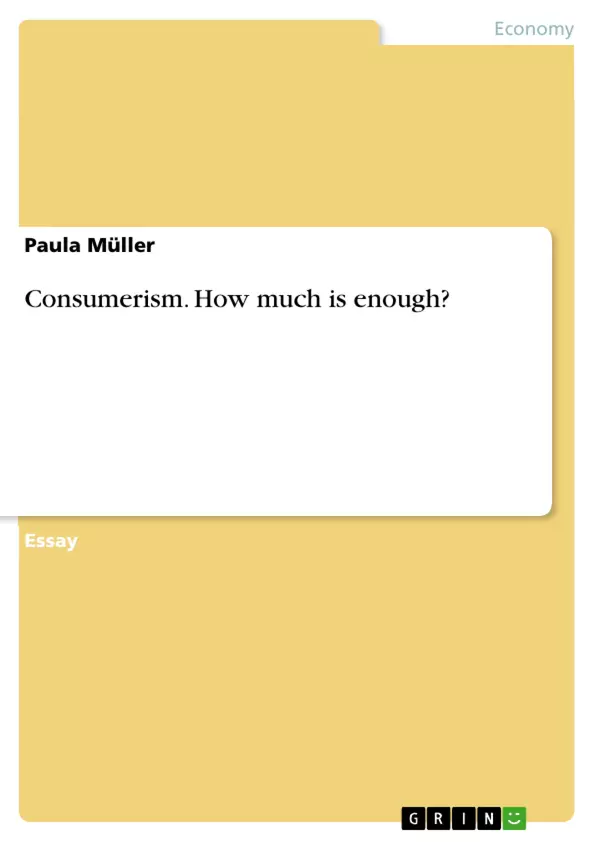Day for day, we are faced with advertisement telling us what we need in order to be happy. And even if you are already content with your life there is always a way to achieve even more happiness. “Think big” as IMAX says; “Nothing is impossible” according to Adidas; “Live better” with Walmart; “Just do it” for Nike; Visit Disneyland, “the happiest place on earth”; Buy “beauty, power and soul” in an Aston Martin; “Live” with IKEA and “open happiness” with Coca Cola.
You require material goods for everything these days: Rolex and Porsche for success, an Apple or Samsung smartphone for friendship and further communication etc. And whenever there is a new model or edition of a product with improved features it must improve your satisfaction, as well, right?
Nonetheless, the people in the big industrial nations who can afford to buy so many goods are not necessarily happier. According to the “Happy Planet Index”, which measures the human well-being, the USA is for instance as unhappy as the majority of African States. In Europe there are only three countries achieving the third lowest index, Ukraine, Romania and Moldova. All the other states are even below that rate. Therefore, the happiest countries are mainly South Americans.
It can be argued if this index is reliable, if the methods are appropriate or whether happiness can be measured in the first place. But looking at other studies as well, the researchers seem to generally agree that the people’s happiness is not necessarily related to the level of consumption and the economic wealth.
Inhaltsverzeichnis (Table of Contents)
- Consumerism: How much is enough?
- Consumerism: How much is enough?
- Consumerism: How much is enough?
- Consumerism: How much is enough?
- Consumerism: How much is enough?
- Consumerism: How much is enough?
- Consumerism: How much is enough?
- Consumerism: How much is enough?
- Consumerism: How much is enough?
- Consumerism: How much is enough?
- Consumerism: How much is enough?
- Consumerism: How much is enough?
- Consumerism: How much is enough?
- Consumerism: How much is enough?
- Consumerism: How much is enough?
- Consumerism: How much is enough?
- Consumerism: How much is enough?
- Consumerism: How much is enough?
- Consumerism: How much is enough?
- Consumerism: How much is enough?
- Consumerism: How much is enough?
- Consumerism: How much is enough?
- Consumerism: How much is enough?
- Consumerism: How much is enough?
- Consumerism: How much is enough?
- Consumerism: How much is enough?
- Consumerism: How much is enough?
- Consumerism: How much is enough?
- Consumerism: How much is enough?
Zielsetzung und Themenschwerpunkte (Objectives and Key Themes)
This essay critically analyzes the concept of consumerism, aiming to define the point at which consumption becomes "too much." It explores the unsustainable nature of excessive consumption and examines the ethical and societal implications of unequal distribution of goods.
- The relationship between consumption and happiness
- The ecological and environmental impact of consumerism
- The ethical considerations of consumerism and its impact on resource distribution
- The definition of "too much" consumption in relation to individual needs and societal well-being
- The exploration of different theories and models to establish limits on consumption
Zusammenfassung der Kapitel (Chapter Summaries)
The essay begins by outlining the definition of consumerism, emphasizing the expansion of wants and needs for goods and services. It then delves into the unsustainable nature of excessive consumption, highlighting the depletion of finite resources. The text further explores the concept of consumerism as a zero-sum game, emphasizing the unequal distribution of goods and its ethical implications.
The author introduces the theory of needs as a framework to define "too much" consumption, drawing on the Skidelskys' work and comparing it to Maslow's hierarchy of needs. The essay outlines various natural needs, including health, security, respect, personality, harmony with nature, friendship, and leisure. These needs are used as a basis to establish limits on consumption.
Schlüsselwörter (Keywords)
The essay focuses on key concepts such as consumerism, sustainability, resource depletion, ethical consumption, needs, and the theory of needs. It emphasizes the importance of defining "too much" consumption based on both individual and societal well-being. The essay aims to provide a framework for establishing sustainable limits on consumption while considering ethical implications and resource distribution.
Frequently Asked Questions
Does higher consumption lead to more happiness?
Research generally suggests that beyond a certain level of wealth, happiness is not necessarily related to consumption or economic riches.
What is the "Happy Planet Index"?
It is an index that measures human well-being and environmental impact, often showing that industrial nations are not the "happiest" countries.
How does the "theory of needs" define excessive consumption?
It distinguishes between natural needs (health, security, friendship) and artificial wants, helping to define the point where consumption becomes "too much."
What are the ecological impacts of consumerism?
Consumerism leads to the depletion of finite natural resources and significant environmental degradation due to excessive waste and production.
Is consumerism considered a "zero-sum game"?
The essay argues that excessive consumption in wealthy nations often occurs at the expense of resource distribution and well-being in other parts of the world.
- Citation du texte
- Paula Müller (Auteur), 2014, Consumerism. How much is enough?, Munich, GRIN Verlag, https://www.grin.com/document/450797



